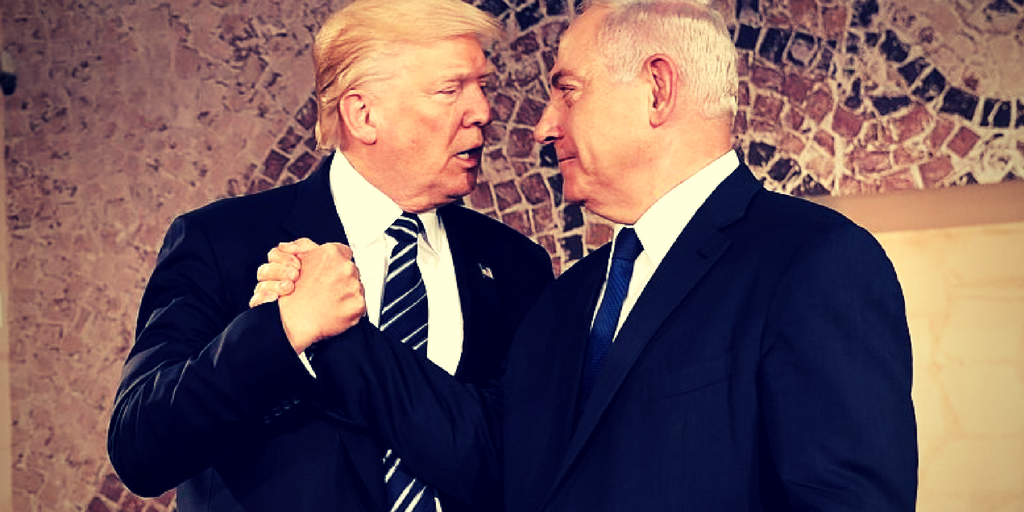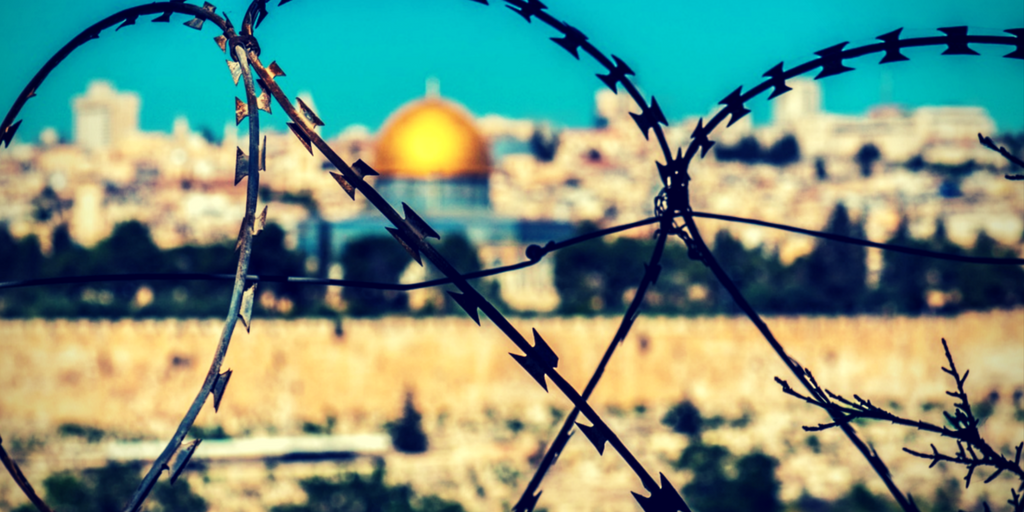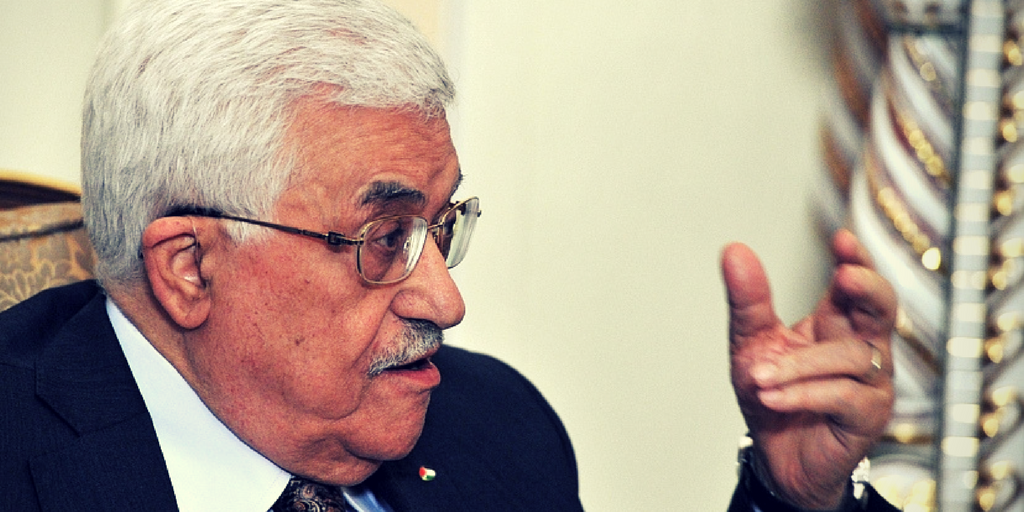Israel ceded the Temple Mount to terrorists last week. But with a clear goal, we can get it back in short order and keep it perpetually for the good of all humanity.
Last week, Prime Minister Binyamin Netanyahu and his security cabinet caved in to the demands of the PLO and its partners in Hamas, the Islamic Movement, Jordan, Iran and Turkey by agreeing to remove metal detectors and other security screening equipment from the Temple Mount. The equipment was installed last month in response to Palestinian incitement and acts of jihadist violence against Israelis, including the murder of two policemen, at Judaism’s holiest site.
After polls showed 77% of Israelis felt he and his cabinet members capitulated to terrorism, Netanyahu issued a statement thanking US President Donald Trump’s senior adviser Jared Kushner and Trump’s senior negotiator Jason Greenblatt for their help in resolving the crisis.
The underlying message of Netanyahu’s statement was that he and his ministers folded like a cheap suit to our enemies’ demands, effectively ceding Israeli sovereignty over the Temple Mount to our enemies because Kushner and Greenblatt pressured them to do so.
But then this week, a congressional intern did us the favor of surreptitiously recording and leaking remarks Kushner made on the issue in off-record remarks to interns at the White House. Kushner’s remarks, which came in response to a question about his role in mediating the Palestinian conflict with Israel, were fairly detailed.
Regarding the Temple Mount crisis, Kushner justified Israel’s decision to place metal detectors at the entrance of the Temple Mount. In his words, following the murder of the policemen by terrorists armed with guns smuggled onto the Mount, “putting up metal detectors on the Temple Mount… is not an irrational thing to do.”
Kushner also emphasized several times the central role that Palestinian incitement played in fomenting the violence on the Temple Mount. He drew the logical conclusion that the same incitement which fomented the violence on the Temple Mount led to the massacre of the Saloman family in their home in Halamish two weeks ago.
Unlike all previous US mediators, Kushner didn’t blame “both sides” for causing the violence. He placed the blame squarely on the Palestinians who incited and committed murder.
In speaking this way, Kushner made clear that he isn’t the type of person who will apply bone-breaking pressure on Israel to capitulate to the demands of terrorist murderers. Certainly Netanyahu and his ministers are strong enough to withstand whatever pressure Kushner and Greenblatt may have brought to bear on them last week.
Indeed, as one administration official put it, “The idea that the same Netanyahu who withstood eight years of unrelenting pressure from the Obama administration crumpled under pressure from Kushner and Greenblatt is simply ridiculous.”
So if it wasn’t American pressure that convinced Netanyahu, Defense Minister Avigdor Liberman and their colleagues in the security cabinet to crumple, why did they do it?
All of their instincts were pointing them down the opposite path.
From a security standpoint, you don’t need to be a genius to understand that you don’t respond to an enemy on offense by surrendering your defenses.
More generally, Netanyahu and his ministers all know that just as releasing terrorists from prison guarantees more dead Israelis, so capitulating to the demands of terrorists ensures more dead Israelis.
But if the decision was wrong from a security standpoint, it was downright crazy from a political perspective. Among the 77% of Israelis who said the decision amounted to capitulation were doubtlessly 100% of Likud and Yisrael Beytenu voters and 85% of Kulanu voters. (Bayit Yehudi voters at least knew their cabinet representatives, Education Minister Naftali Bennett and Justice Minister Ayelet Shaked, voted against the measure.)
According to the media, the cabinet was intimidated into surrendering by a doomsday scenario presented by the IDF and Shin Bet representatives at the cabinet meeting. Channel 2 reported that the IDF and Shin Bet warned the politicians that failure to capitulate would result in a security nightmare, whose details they laid out in a frightening PowerPoint slide.
The Palestinians would start a new terrorist war, they said.
Fatah’s Tanzim terrorists, who have been inactive in recent years, would renew their attacks, they warned.
The Palestinians would undermine Israel’s capacity to fight Hezbollah effectively in Lebanon, they insisted.
And finally, if Israel failed to capitulate, a “rare unity” of forces in the Islamic world stretching from Turkey to Iran would emerge, they hectored.
Not to put too fine a point on it, but all of these doomsday admonitions are debatable.
Take the issue of the “rare unity” from Iran to Turkey.
Since the Turks tried to break Israel’s maritime blockade of Hamas-controlled Gaza seven years ago, unity has been the rule not the exception in Turkish-Iranian relations. Both supported the Muslim Brotherhood in the so-called Arab Spring. Both supported Hamas in its 2014 war against Israel from Gaza. And today, both support Qatar against the Saudi- and Egyptian-led bloc of Sunni Arab states.
As for the Sunni Arabs, last week, the Saudis took the stunning step of siding with Israel on the metal detectors. The Saudis noted supportively that they installed metal detectors in Mecca and Medina.
As to the rest of the scenarios the security chiefs raised, they may or may not be true. But what is certainly true is that it isn’t the job of the security community to tell Israel’s leaders they have no choice but to surrender to aggression. It is their duty to formulate plans for defeating the aggressors, period.
And incidentally, ahead of Tisha Be’av, which fell this year on Monday night/Tuesday, unlike the IDF and the Shin Bet, the police did just that. Whereas the Shin Bet wanted to prohibit Jews from visiting the Temple Mount on the day of mourning commemorating the destruction of the First and Second Temples, the police recognized it was its job to enable Jews to visit.
Rather than join the Shin Bet in recommending that Jews be barred from visiting the Temple Mount, the police provided the requisite protection and enabled more than 1,200 Jews to visit the site without incident.
The fact that Police Commissioner Roni Alsheich provided security when Shin Bet Director Nadav Argaman said it couldn’t be done makes it hard to avoid the impression that the warnings the IDF and Shin Bet chiefs issued the security cabinet last week stemmed less from professional considerations than from ideological or political agendas.
This impression is strengthened when last week’s horror scenarios are seen in the context of the security establishment’s long history of blocking the implementation of government policies it was its duty to facilitate.
For instance, in 2010 and 2012, the commanders of the IDF and the Mossad reportedly refused to carry out Netanyahu’s order to prepare their forces to strike Iran’s nuclear installations.
And then-Shin Bet director Ami Ayalon’s move to blame Netanyahu when the Palestinians unleashed a terrorist offensive in 1996 after Netanyahu’s first government opened a second entrance to the tunnels below the Western Wall is etched in collective memory.
But for all their institutional and personal drawbacks, there is a limit to the amount of blame you can place on Israel’s security leadership for the cabinet’s decision to surrender to terrorists last week. After all, while it is true the IDF and Shin Bet commanders crossed the line, Netanyahu and his ministers let them cross it.
If Netanyahu and Defense Minister Avigdor Liberman wanted to, they could easily have blunted the security brass’s push for capitulation. They certainly could have publicly criticized them for their defeatism rather than insinuate that the Americans made them capitulate.
So why haven’t Netanyahu and Liberman called them to order? Why doesn’t Netanyahu – at a minimum – publicly criticize his generals for their insubordination and contrast their spinelessness with Alsheich’s professional competence and determination?
The answer is discouraging. Netanyahu allows himself and his cabinet members to be bullied by his generals because he doesn’t have a policy for securing Israeli sovereignty and advancing Israel’s national interests at the Temple Mount. Without a positive goal, he is reduced to treading water with the hope of keeping a lid on Muslim jihadists. And so his “policy” of bowing to his politically subversive generals bears a disquieting resemblance to George Orwell’s quip, “The quickest way of ending a war is to lose it.”
Perhaps the depressing aspect of all of this is that it isn’t hard to figure out what a reasonable, constructive policy would be for the Temple Mount.
As a liberal democracy, Israel has an interest, indeed a duty, to ensure that the holy site is open to all religions and that everyone has the right to freely worship on the Temple Mount. Given the fact that the Temple Mount is the holiest place in the world for Jews, Israel has a vital interest in securing its sovereign control over the area.
To secure its sovereignty and advance its clear interest in facilitating religious freedom for all, Israel’s policy goal is straightforward. The government should enable all faiths to worship freely at the site.
To secure this end, the government should announce its goal and make a good-faith effort to involve all relevant groups and governments, including the Palestinian Authority, Christian authorities, Jewish authorities, the Jordanian regime and others in achieving it. The government should also state outright that if the Palestinians opt instead to incite and commit acts of violence and terrorism from the Temple Mount, Israel will secure its goal and enable Jews and Christians to worship at the holy site unilaterally.
To date, the Temple Mount has been the Palestinians’ ace in the hole. They recycle the blood libel that Jews are endangering al-Aksa every time they feel they are losing ground in their never-ending war against Israel. And Israel inevitably capitulates.
But if Israel announces its policy is to secure religious freedom for all on the Temple Mount and makes a good-faith effort to advance it in conjunction with the Palestinians and all other relevant groups, it will set the conditions for taking that ace away.
If after it begins good-faith efforts to collectively advance the liberal, democratic goal of ensuring religious freedom for all at the holy site, the Palestinians again turn to violence, then the Islamic world, or parts of it, will be in a position to blame them when Israel unilaterally enables Jews and Christians to pray on the Temple Mount parallel to Muslim worshipers.
If Netanyahu and his ministers make this their goal then the IDF and the Shin Bet won’t be able to intimidate them into capitulation next time around. Instead, the leaders of the IDF, the Shin Bet and the Foreign Ministry will all know their jobs and know that if they fail to perform they will be replaced.
Israel ceded the Temple Mount to terrorists last week. But with a clear goal, we can get it back in short order and keep it perpetually for the good of all humanity.
Originally Published in the Jersualem Post.






